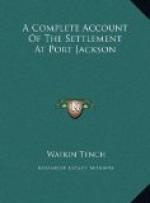The necessity of repose, joined to the succeeding heat of the day, induced us to prolong our halt until four o’clock in the afternoon, when we recommenced our operations on the opposite side of the north arm to that we had acted upon in the morning. Our march ended at sunset, without our seeing a single native. We had passed through the country which the discoverers of Botany Bay extol as ’some of the finest meadows in the world*.’ These meadows, instead of grass, are covered with high coarse rushes, growing in a rotten spongy bog, into which we were plunged knee-deep at every step.
[The words which are quoted may be found in Mr. Cook’s first voyage, and form part of his description of Botany Bay. It has often fallen to my lot to traverse these fabled plains; and many a bitter execration have I heard poured on those travellers, who could so faithlessly relate what they saw.]
Our final effort was made at half past one o’clock next morning; and after four hours toil, ended as those preceding it had done, in disappointment and vexation. At nine o’clock we returned to Sydney, to report our fruitless peregrination.
But if we could not retaliate on the murderer of M’Entire, we found no difficulty in punishing offences committed within our own observation. Two natives, about this time, were detected in robbing a potato garden. When seen, they ran away, and a sergeant and a party of soldiers were dispatched in pursuit of them. Unluckily it was dark when they overtook them, with some women at a fire; and the ardour of the soldiers transported them so far that, instead of capturing the offenders, they fired in among them. The women were taken, but the two men escaped.
On the following day, blood was traced from the fireplace to the sea-side, where it seemed probable that those who had lost it, had embarked. The natives were observed to become immediately shy; but an exact knowledge of the mischief which had been committed, was not gained until the end of two days, when they said that a man of the name of Bangai (who was known to be one of the pilferers) was wounded and dead. Imeerawanyee, however, whispered that though he was wounded, he was not dead. A hope now existed that his life might be saved; and Mr. White, taking Imeerawanyee, Nanbaree, and a woman with him, set out for the spot where he was reported to be. But on their reaching it, they were told by some people who were there that the man was dead, and that the corpse was deposited in a bay about a mile off. Thither they accordingly repaired, and found it as described, covered—except one leg, which seemed to be designedly left bare—with green boughs and a fire burning near it. Those who had performed the funeral obsequies seemed to have been particularly solicitous for the protection of the face, which was covered with a thick branch, interwoven with grass and fern so as to form a complete screen. Around the neck was a strip of the bark of which they make fishing lines, and a young strait stick growing near was stripped of its bark and bent down so as to form an arch over the body, in which position it was confined by a forked branch stuck into the earth.




